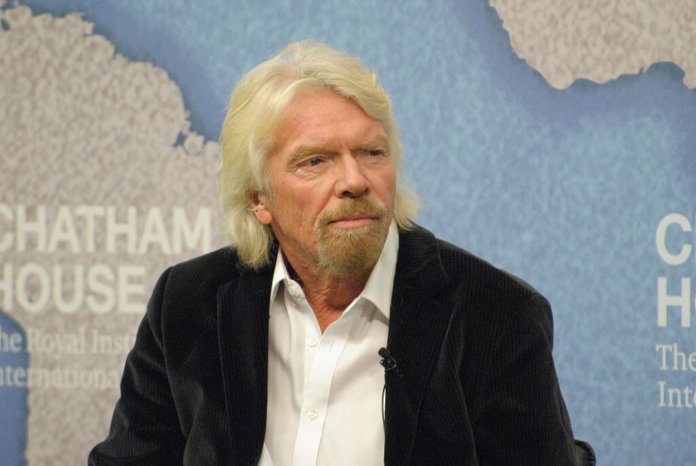
He is arguably the most famous celebrity businessman not currently occupying the White House. His current worth tops more than $5 billion and his companies are some of the industry leaders in travel, mobile phones, hospitality, healthcare, tech, entertainment, and others too numerous to mention. He is known for being an adventurous spirit, both in and out of the boardroom. And his failures almost equal in number to his successes.
He is, of course, Richard Branson, Co-Founder of the Virgin Group.
Since first starting his record stores in the early 1970’s, Branson has built his empire through his reputation for being a bit of a daredevil. He gained notoriety in the business community by leaping headlong into different industries without any previous experience. The name “Virgin” came from the fact that when they went into the record store business, they had no previous track record or knowledge to draw from.
To the general public, he became known as one of the two men to be the first to cross the Atlantic in a hot air balloon from July 2-3, 1987. Whatever he has attempted, adventure is in his DNA.
“My interest in life comes from setting myself huge, apparently unachievable challenges and trying to rise above them … from the perspective of wanting to live life to the full, I felt that I had to attempt it,” he once said.
Of course, you don’t have to be a daredevil CEO yourself to benefit from the lessons he has learned along the way. Branson is the first to admit he’s made his share of mistakes and those can be even more instructive than his successes. Whether you are a CEO, an entrepreneur, or just someone trying to navigate the choppy waters of today’s business environment, here are five lessons we can learn from Richard Branson’s experience with The Virgin Group.
Lesson #1 – Don’t be afraid to take on the big boys (or “sue the bastards!”)
In 1984, Branson and the Virgin Group entered the airline business with the launch of their Virgin Atlantic airline. They were immediately seen as major competition for the UK industry kingpin, British Airways.
Virgin noticed a series of what they believed to be underhanded tricks designed to turn people off Virgin and on to BA. A 1993 article in The Atlantic reported, “According to Virgin the…incidents were connected by a common theme – they were products of a worldwide strategy by BA to exert its supremacy over its smaller rival. There were different strands to the strategy, ranging from one campaign called Mission Atlantic to others codenamed Hunters and Operation Barbara.”
One day Branson was approached by Sir Freddie Laker who once ran a discount airline that was forced out of business by what he deemed to be similar tactics by BA. Branson recounted the exchange recently on the Freakonomics Podcast.
“He just gave me a couple of bits of advice. He said, “Three words you got to remember: sue the bastards.” And he said that British Airways will do everything they can to put you out of business. You have to take them to court before you go out of business, rather than afterwards. And I took his advice. We took British Airways to court for a dirty tricks campaign they waged against us. We won the largest libel damages in history. And we distributed — it was Christmas time — we distributed it to all our staff. And it became known as the British Airways Christmas bonus. So we were very popular that Christmas.”
Lesson #2 – Carve out your own path
Almost nothing Richard Branson has done in his entrepreneurial journey has been by conforming to the mainstream. This is something he not only believes has been key to his success, it’s part of his identity.
In a 2014 interview with Forbes, he was asked what makes his company culture unique.
“Rule-breaker – because I never learned the rules in the first place. To change the game is at the heart of what Virgin stands for, so the company culture has always been: “Don’t sweat it: rules were meant to be broken.”
A good example of this non-conformist attitude at play lies with the company’s attitude towards researching competition. The business textbook says this is crucial to surviving in the marketplace. Branson would beg to differ.
“Researching the competition has never been the Virgin way. Many of our products and services come about because we pay attention to what the market is missing or what’s not being done well. The commitment is about doing things differently.
Our strategy has been to screw business as usual. To look at what it is our customer wants, and what it is the industry needs, and to go in and exceed their expectations. And we’ve been successful not by wasting time scrutinizing our competitors but by looking at ourselves from the point of view of our customers do and seeking feedback through listening.”
Lesson #3 – You must learn to delegate
The common perception of the modern CEO is they have their fingers in every decision and are on top of every happening in the company. No decision can be made until the boss gives it the okay. While there may be some who adhere to this practice, Branson is not one of them.
He believes that the only way to be an effective CEO is to let go of the reins and trust the people you have around you. Too much control can be a bad thing.
“I actually believe that people should delegate early on in their businesses, so they can start thinking about the bigger picture. If I’m ever giving a talk to a group of young businesspeople, I will tell them you know, go and take a week out to find somebody as good or better than yourself. Put yourself out of business, and let them get on and run your business day to day, and then you can start dealing with the bigger issues, and you can take the company forward into bigger areas, and you can — maybe if you’re an entrepreneur, you can start your second business or your third business. And so I think too many young entrepreneurs want to cling on to everything, and they’re not good delegators.”
Lesson #4 – Don’t be afraid to fail
Fear of failure is one of the biggest factors holding back many entrepreneurs out there today. The perception is that if a venture fails, the entrepreneur will be saddled with the stench of failure for eternity.
Of course, this is an irrational fear and one that never stood in Richard Branson’s way. For all of his successes, he’s also seen his fair share of failure.
In the mid-1990’s he set out to take on Coke and Pepsi in the cola wars when he launched Virgin Cola. “Coke is the best known brand in the world, and if we could topple Coke, we thought it would be a lot of fun,” he said. But he didn’t and after only a few years, Virgin Cola folded. Other ventures met a similar fate as was the case with Virgin Cars, Virgin Brides (A Bridal Boutique), and Virgin Digital.
Still, he has no shame looking back because, despite these failures, he still maintains one significant point of pride.
“We’ve never had a company go bankrupt. Because our reputation is everything. And we believe that if you can afford to, if a company is not working out, you must settle all your debts. And so you know, we’ve never had a bankruptcy, and that’s in 50 years, so we’re proud of that. And I think that’s really helped keep the reputation of Virgin…I think, you know, fortunately we’ve been ahead of the game over the last 50 years. So by and large, we’ve had many more successes than we’ve had things which we’ve had to say goodbye to.”
Lesson #5 – Don’t make your employees feel like prisoners
The modern workplace is quickly changing as technology continues to evolve. More and more people are working remotely or looking to take mini-sabbaticals. For the traditionalists, this is seen as a very unwelcome change. They prefer the old-school approach of being in the office 8:30 to 4:30 Monday through Friday.
It should not come as a major surprise that Branson does not subscribe to this worldview. He is a firm believer in not making your people feel like prisoners in your workplace.
“Let’s just look at this business of forcing people to come to an office. First of all, you’ve got maybe an hour or an hour and a half of travel time in the morning, another hour and a half of travel time in the evening. And, you know, when you’re at the office, it’s important that you say hello to everybody and that you’re friendly with everybody, so you use up another hour or two, you know, socializing with people. Then, because you’re not at home, you need to communicate with your family. So you spend another bit of time communicating with your family. And so the day carries on and you might get a couple hours of work done. If you’re at home, you know, you wake up. You can spend a bit of time with your family. And be a proper father, which is perhaps the most important — or mother — most important things that we can do in our life. But you can also find the time to get whatever your job is done, because you’ve got another four or five hours free to do it. And you know, we’ve never been let down by people that we’ve given that trust to. I think treating people as adults, giving people trust, is so important.









